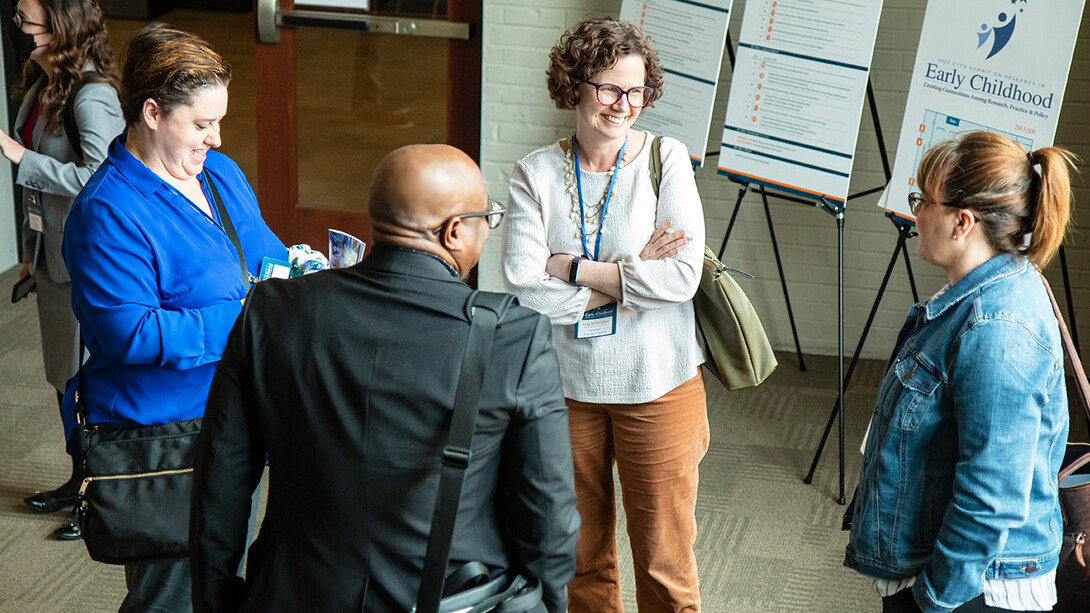
Creating connections among early childhood research, practice and policy — and how each can enhance the lives of young children and their families — provided the central theme of the 2022 Child, Youth, Families and Schools (CYFS) Summit on Research in Early Childhood.
Nearly 200 attendees, including researchers from across the University of Nebraska system, practitioners, administrators, community partners and policymakers, gathered April 13 at Nebraska Innovation Campus for the daylong, sixth biennial summit.
The summit highlighted the latest research to advance early childhood education and development, and implications for practice and policy.
“We are as committed as ever to keeping Nebraska at the forefront of groundbreaking early childhood research, and today’s event is one solid piece of the foundation on which that commitment is built,” said Sue Sheridan, director of the Nebraska Center for Research on Children, Youth, Families and Schools. “Through our collective, interdisciplinary efforts, we can generate bold ideas for the future and make meaningful progress in addressing this important grand challenge.”
Ted Carter, University of Nebraska president, welcomed attendees to the summit and praised ongoing efforts of early childhood research. He encouraged researchers to continue their work.
“The work in this space is so important,” Carter said. “Be energized and excited about what you learn here today so we can make a difference in these most challenging times for young children and their families. Your work truly drives the future.”
Keynote speaker Cynthia Osborne, professor of early childhood education at Vanderbilt University’s Peabody College of Education and Human Development, outlined the conditions in which children thrive and discussed the most effective state-level policies that help create those conditions.
“Our earliest experiences shape our lives,” said Osborne, who also serves as director of Prenatal-to-3 Policy Impact Center. “We know those first three years really set the trajectory for life and well-being. If you want to invest in children’s development, you should invest in their development in the first three years.”
Osborne said state policy choices can reduce family stressors and increase capacities, which have substantial impacts on children’s early development — and their health and well-being throughout their lives.
“If we get it right early, it makes things much easier down the road,” she said. “We need to be innovative and try new things, and focus on reducing disparities and closing gaps to ensure all children have their right to thrive from the start.”
Throughout the day’s breakout sessions and panel discussions, research topics spanned children’s school readiness, parent engagement, special education, health and nutrition, STEM, social-emotional development, and teacher training and professional development.
“What we are doing here is applying ideas and solutions to issues of concern to families with children, and to the nation overall,” said Sam Meisels, founding executive director of the Buffett Early Childhood Institute. “Our work is so important to the future of the nation.”
Matthew Blomstedt, Nebraska commissioner of education, shared closing thoughts, noting how early childhood research drives future success. He thanked researchers for their work and collaboration in aligning research, practice and policy.
“Just because you are dealing with small people, you’re not doing small things,” he said. “You have the chance to help develop leaders for the future.”
The event concluded with a poster session that featured 27 graduate students showcasing their early childhood research and answering questions about their work.
The summit was jointly sponsored by CYFS; the Nebraska Academy for Early Childhood Research; the College of Education and Human Sciences; the Buffett Early Childhood Institute; and First Five Nebraska (https://www.firstfivenebraska.org/).
View summit videos, research presentations and posters on the CYFS Early Childhood Research website.
Search #ECSummit22 on Twitter to see posts about the summit.








